Fermented cherry tomatoes are an excellent way to preserve an abundance of cherry tomatoes. The finished fermented tomatoes have a slight effervescence and amazing flavor!
Preserving Cherry Tomatoes with Fermentation
We have so many cherry tomatoes in the garden this year, it’s ridiculous. This isn’t necessarily a bad thing, as they are super sweet and delicious, but it’s becoming hard for us to consume them all!
What makes it even more difficult is that cherry tomatoes aren’t usually preserved in the same manner as larger tomatoes, such as canning. But what about fermenting?
I flipped through my copy of Fermented Vegetables by Kirsten and Christopher Shockey of FermentWorks, and was happy to find a recipe for fermented cherry tomatoes! They have kindly given me permission to include that recipe here.
How to Ferment Cherry Tomatoes
The main trick to this recipe is to use cherry tomatoes, or other small tomatoes, that are not fully ripe. The problem with fermenting ripe tomatoes is that the sugars in them want to turn to alcohol.
Tomato wine, anyone?
While a boozy effervescent tomato drink does sound intriguing in a bloody mary kind of way (and may be something that I try one of these days), that’s not what I was going for this time around.
Picking a bunch of under ripe cherry tomatoes took me no time at all. It’s even ok if the tomatoes are mostly red, as long as they are still quite firm.
You do want to avoid using totally green tomatoes that haven’t even begun to ripen yet. For those you can use my fermented green tomatoes recipe.
Fermented Cherry Tomato Recipe
Put the peppercorns, coriander seeds, and mustard seeds into the bottom of a quart sized jar, then layer in the tomatoes, parsley, basil, and garlic.
Mix together the water and salt to make a brine, and pour over the tomatoes, making sure to cover them completely.
Use a weight to keep the tomatoes under the brine, and cover the jar with a towel.
Put in a cool and dark corner to ferment for 6-8 days.
Taste them along the way. When the tomatoes are finished fermenting they will burst with a champagne-like effervescence in your mouth.
Cover with a lid and store in the fridge. They are best after 1 to 2 weeks.
These fermented cherry tomatoes will continue to gain effervescence even under refrigeration. The pressure is not in the jar, but in the tomatoes themselves!
My jar did produce some nice bubbles, probably because several of my tomatoes burst during the process, emitting their sweetness.
These fermented cherry tomatoes turned out super delicious! I loved the slight effervescence in them, and the fresh herbs added nice flavor as well.
This is a perfect way to use up cherry tomatoes at the end of the season.
These fermented cherry tomatoes will last for about 6 months in the fridge.
These cherry tomatoes are beautiful during fermentation and afterward!
They do lose their color slightly, but will still make a lovely addition to an appetizer platter. Or just pop them in your mouth whenever you feel the need for a fizzy cherry tomato!
Fermented Vegetables Book
If you don’t have the book Fermented Vegetables yet, this is the perfect time to get it. There are so many great recipes for fermenting the harvest, and I have to say that it’s my favorite book on the subject!
I hope you give these fermented cherry tomatoes a try, I think you will love them!
Fermented Vegetables
Dig a little deeper and find recipes for even more of our favorite fermented vegetables!
- Sauerkraut
- Fermented Green Tomatoes
- Fermented Asparagus with Garlic
- Lacto-Fermented Dilly Beans
- Fermented Cucumber Pickles
Fermented Cherry Tomatoes
Ingredients
- 4 cups under ripe cherry tomatoes
- 1 sprig fresh parsley
- 2 stems fresh basil
- 4 cloves garlic peeled
- 1/4 teaspoon peppercorns
- 1/4 teaspoon coriander seeds
- 1/4 teaspoon mustard seeds
- 4 cups unchlorinated water
- 3 Tablespoons kosher, pickling, or sea salt do not use iodized table salt
Instructions
- Put the peppercorns, coriander seeds, and mustard seeds into the bottom of a quart-sized jar, then layer in the tomatoes, parsley, basil, and garlic.
- Mix together the water and salt to make a brine, and pour over the tomatoes, making sure to cover them completely.
- Use a weight to keep the tomatoes under the brine, and cover the jar with a towel.
- Put in a cool and dark corner to ferment for 6-8 days.
- Taste them along the way. When the tomatoes are finished fermenting they will burst with a champagne like effervescence in your mouth.
- Cover with a lid and store in the fridge. They are best after 1 to 2 weeks.
Notes
- These fermented cherry tomatoes will continue to gain effervescence even under refrigeration. The pressure is not in the jar, but in the tomatoes themselves!
- Refrigerate for up to 6 months.
Nutrition


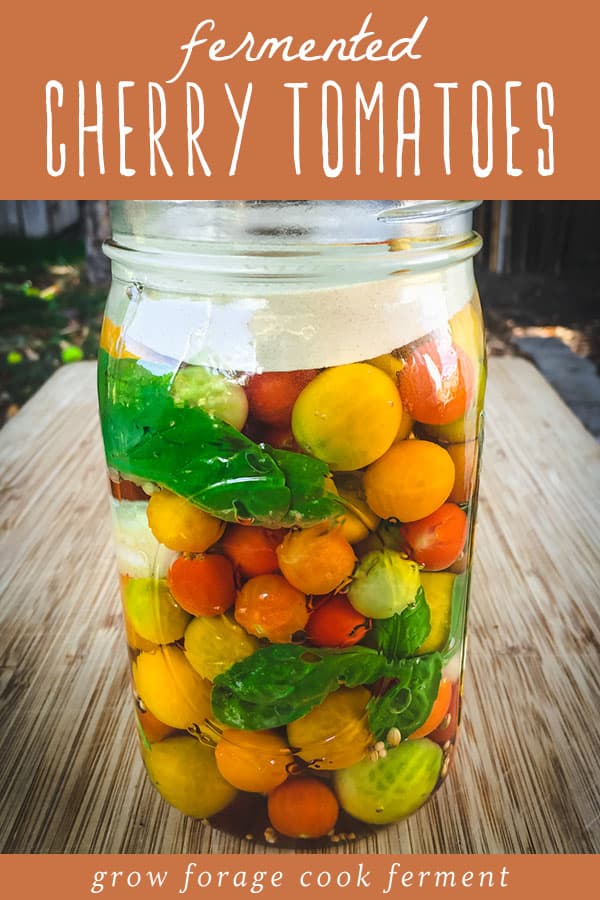
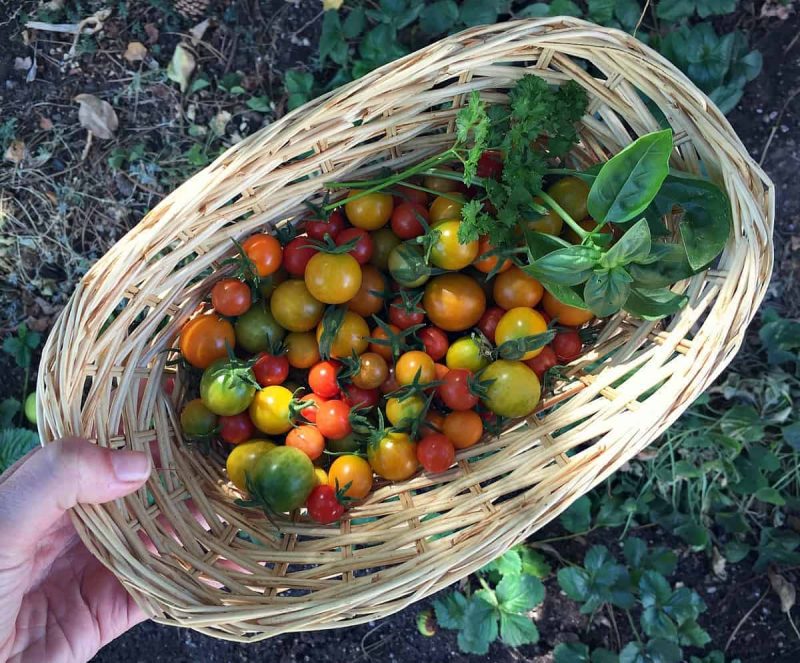

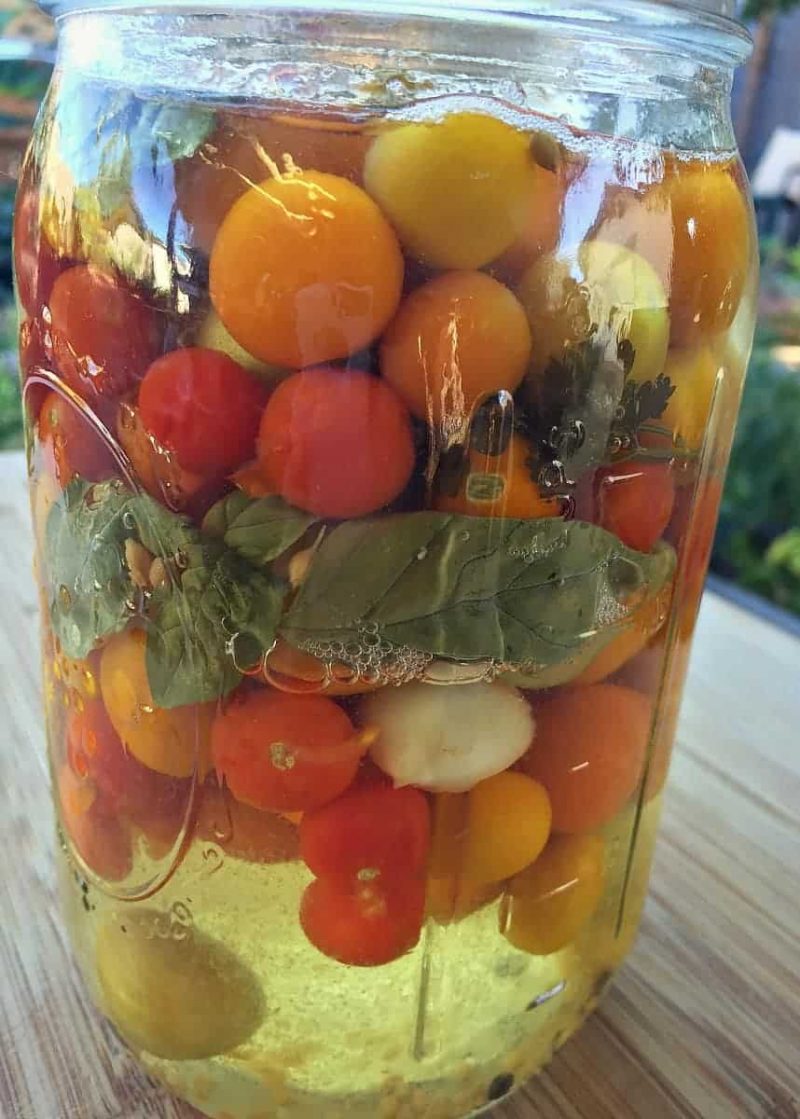
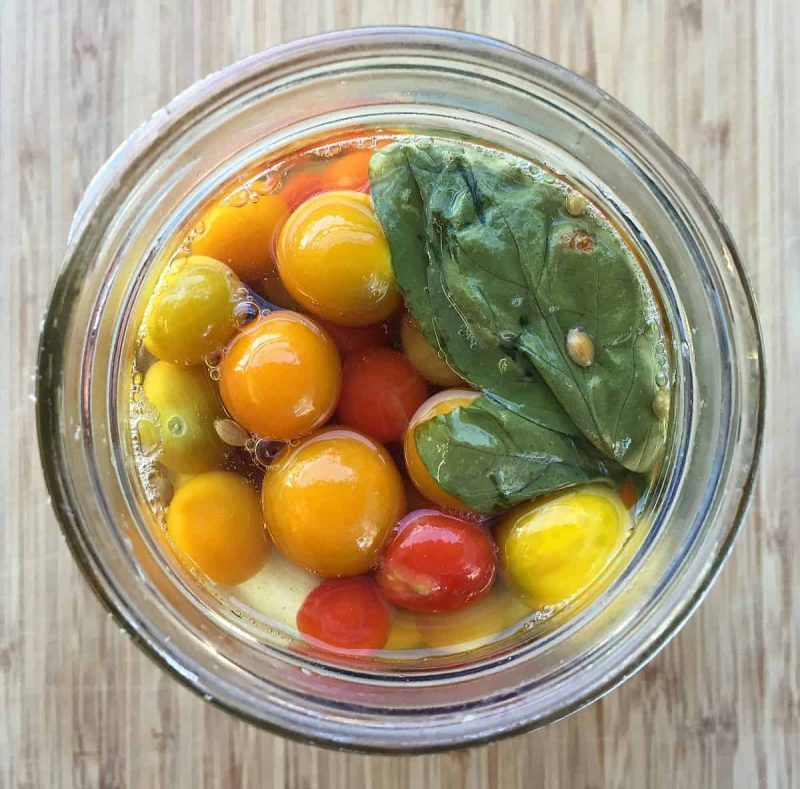
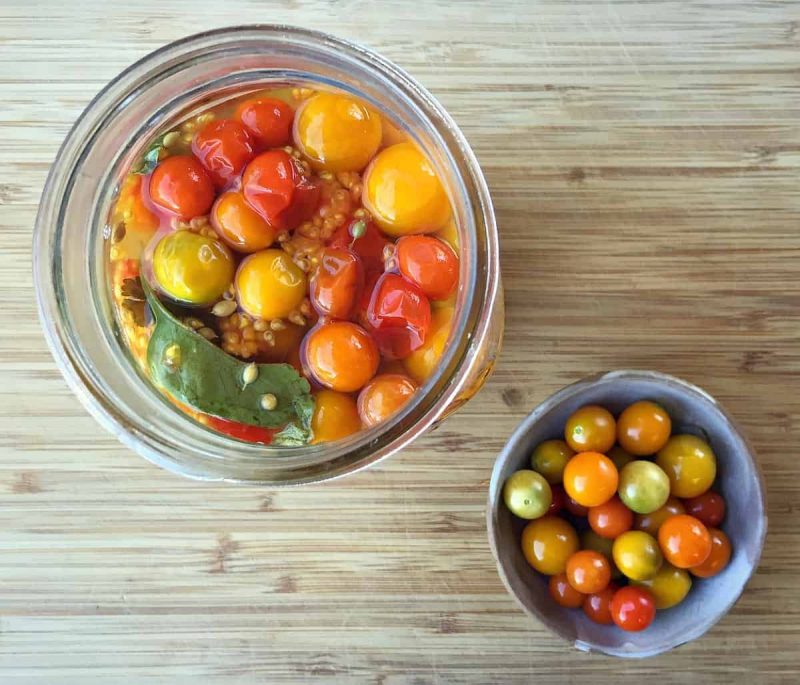
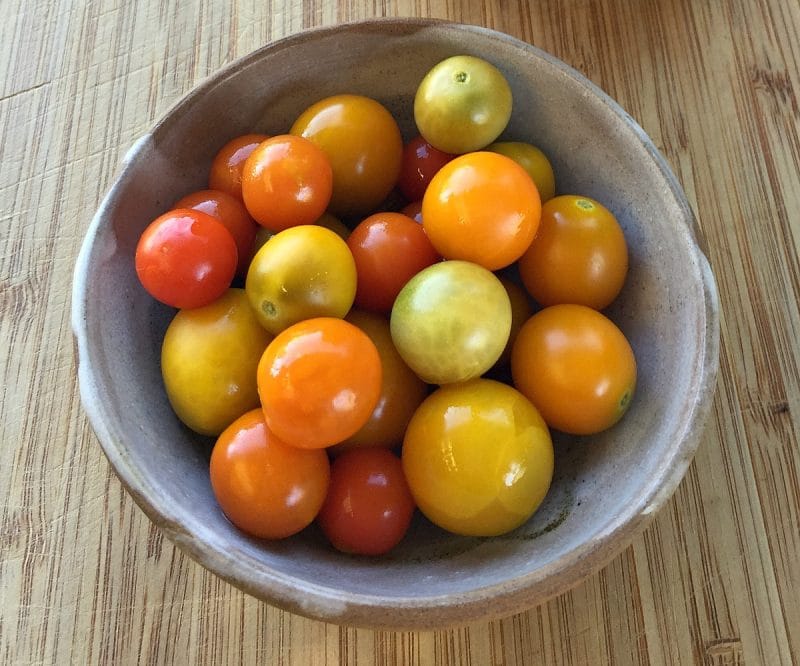

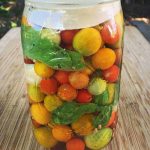

My cherry tomatoes that I did in brine about five weeks ago e have been in the fridge I just opened and didn’t realize they would have fermented and I must be the odd one out as I didn’t like the fizzy taste……what can I do with them I have a large jar full , they do look very healthy…..help!
Sorry, you didn’t like the fizzy taste, Valerie! Pureeing them into a sauce or chutney would likely help dissipate the fizziness.
Larger particle salt like Kosher and smaller particle salt take like canning salt use different measurements.
In all ferments using 3% to 5% salt for water plus veges is much more consistent.
Just use grams and the math is easy. 500g of water and tomatoes use 15 to 25g salt, any particle size.
One percent is .01*500=5
So 3% = 15g
and 5% = 25g
These turned out really well for me and I do like them. I tasted after four days and they were good, just a little too salty. Does a longer ferment make them less salty? Or can I cut back on the amount of salt used without affecting the fermenting process? Thank you kindly for the recipe and the help!
Hi Rhonda, no a longer ferment wouldn’t change the saltiness. The salt is there to assist in fermentation and to inhibit mold. You could experiment with lower salt levels, but do some research on low salt ferments first!
Please advise. After the fermenting is finished do we still need a weight in the jar?
Nope, it’s no longer necessary to keep them submerged under the brine once they’re refrigerated.
Do I boil the brine or dissolve the salt cold? Thanks! Looking forward to making them!
Hi, Lisa! You want to mix the water and salt together. I usually shake both together in a mason jar until the salt is dissolved.
Hi Colleen, I made 2 jars of these tomatoes following the recipe closely. It has been 8 days now and I haven’t seen any little bubbles. Should there be some, or is that ok if there are none? Haven’t tasted yet… they look wonderful..thanks for the recipe..
This is a more general question. I am fermenting hot peppers and gsrlic from our CSA. Can I keep adding more peppers and garlic to the ongoing ferment as I get more peppers?
Dumb question – I made some beautiful tomatoes following your recipe and I’m ready to put them in the refrigerator. Do they still need to be under the brine completely? Help. Thank you in advance.
Can you add onion & copped sweet peppers with the tomatoes in the refrigerated pickled tomatoes?
Thank you for this unique idea! I made these for the first time using the herbs I had in my garden – tulsi basil leaves, a couple of oregano leaves and several blossoms, and a couple of regular basil leaves. They are delicious!! A bit like the flavor of a nice bruschetta without the cheese all in one lovely bite!
Made these for the first time! Thanks for the recipe. Once I cover and put them in the fridge do I still need to keep all the tomatoes submerged and continue to check for white film etc. every day?
What does this taste like? Is it tangy, sour like pickles? Sweet?
I’ve been fermenting fruits and veggies for about 5 years. This spring I concocted my newest favorite. I rinsed the stems from a bunch of organic beets and cut them into 1 1/2 inch lengths. I dropped them in a jelly jar with half a stick of cinnamon and about 1/4 teaspoon whole anise seed. I filled the jar with brine from a previous batch of fermented ginger carrots, dropped in a glass shot glass to keep the stems submerged, and then screwed on the cap. I burped them daily for 3 days and they are delicious! I’m hoarding them and not sharing them with my colleagues as I usually with my ferments.
Looks absolutely delicious. I know What I will be fermenting today. Waiting is going to be hard so I’ll make quite a few jars to cheat while the rest sit for a few more weeks…
Oh yes, trying this TODAY! We are swimming in cherry tomatoes. I’m going to try some with fresh chervil too.
I had some mold at the top of the jars. I think because I used paper towels and they got damp? Still safe??
If it is fuzzy mold I would not consume it.
I’m new to fermenting so please bare with me. I’m making the cherry bombs in smaller jars …..how do I keep them sub-merged? Any tricks?
You can top off the jar with a ziplock bag partially filled with water which will serve as a weight to hold down the product you are fermenting.
Thank you so much for this tip. This is awesome.
Hi Michelle, you need to use some kind of fermenting weight to keep them under the brine.
I made a lot with just tomatoes and basil. Sensational!
I love this! I have yet to try a fermented cherry tomato but it looks appetizing. I wonder if they would go well on a salad or if you’d mainly use them as a garnish of some sort on a dish. I love tomatoes as a whole but I also love fermented food, so I wonder if having fermented tomatoes would be a double whammy! Thank you for sharing this recipe, I can’t wait to try it!